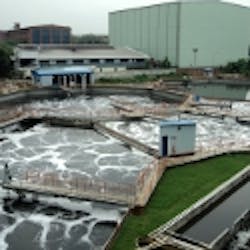Bio-electric wastewater treatment in Bangladesh
An industrial wastewater treatment facility has commenced full operation to treat effluent from Dhaka’s Economic Processing Zone (DEPZ) industries.
Singapore company- Flagship Ecosystems Investment Private Limited (FESI)established the SGD10 million treatment plant in Bangladesh on a 30-year Build-Own-Operate arrangement with BEPZA (the free trade zone authority in Bangladesh).
Operations started at the facility with it treating an estimated 15,000 m3/day of effluent to serve the collective needs of the more than 44 companies in the Old Zone of Savar DEPZ.
The CETP will expand its capacity to 43,000 m3/day within the next year to receive effluent from the 55 companies in the New Zone of Savar DEPZ.
Effluent is treated to meet Bangladeshi Department of Environment Regulations before being discharged into the inland waterway. At present BEPZA has no plan to re-cycle the water.
The CETP employs a newly developed Bio-Electric Process to treat the effluent using a Bio-Electric treatment profile on a co-mingled industrial wastewater stream.
###
